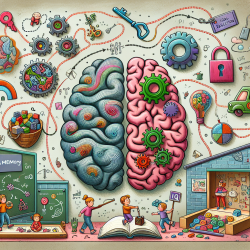The intricate relationship between Attention Deficit Hyperactivity Disorder (ADHD) and cognitive performance has been a topic of significant interest in educational and psychological research. A recent study titled "The Etiological and Predictive Association Between ADHD and Cognitive Performance From Childhood to Young Adulthood" sheds light on how these two factors interact over time. This blog aims to help practitioners improve their skills by implementing the outcomes of this research or by encouraging further exploration into this vital area.
The Study at a Glance
The research utilized a cross-lagged model design to examine the predictive and etiological patterns between ADHD diagnosis and cognitive performance. The study involved 404 participants, aged 6 to 17 years at baseline and 12 to 24 years at follow-up. Key cognitive measures included IQ, short-term memory, working memory, and response speed.
Key Findings
- Reciprocal Relationship: ADHD and IQ were found to predict each other over time. This suggests that interventions targeting one may influence the other.
- Working Memory Impact: ADHD at baseline was linked to lower working memory performance at follow-up, highlighting the need for early intervention strategies.
- Stable Influences: The study identified stable etiological influences in the association between ADHD and cognitive variables across time.
Implications for Practitioners
The findings from this study provide valuable insights for practitioners working with students diagnosed with ADHD. Here are some practical strategies to consider:
1. Early Intervention is Key
The study underscores the importance of early intervention. Practitioners should focus on identifying signs of ADHD early in a child's life. Early interventions can potentially mitigate the negative impact on working memory and other cognitive functions.
2. Tailored Educational Strategies
The reciprocal relationship between IQ and ADHD suggests that educational strategies should be personalized. Consider incorporating activities that enhance cognitive skills while accommodating the unique challenges faced by students with ADHD.
3. Continuous Monitoring
The stability of etiological influences indicates that continuous monitoring of both ADHD symptoms and cognitive performance is crucial. Regular assessments can help track progress and adjust interventions as needed.
4. Encourage Further Research
This study opens up avenues for further research into how specific interventions can alter the trajectory of cognitive development in individuals with ADHD. Practitioners are encouraged to stay informed about ongoing research and incorporate new findings into their practice.
The Road Ahead
The relationship between ADHD and cognitive performance is complex but understanding it can lead to more effective interventions. By applying these insights, practitioners can make a significant difference in the educational outcomes of students with ADHD.










